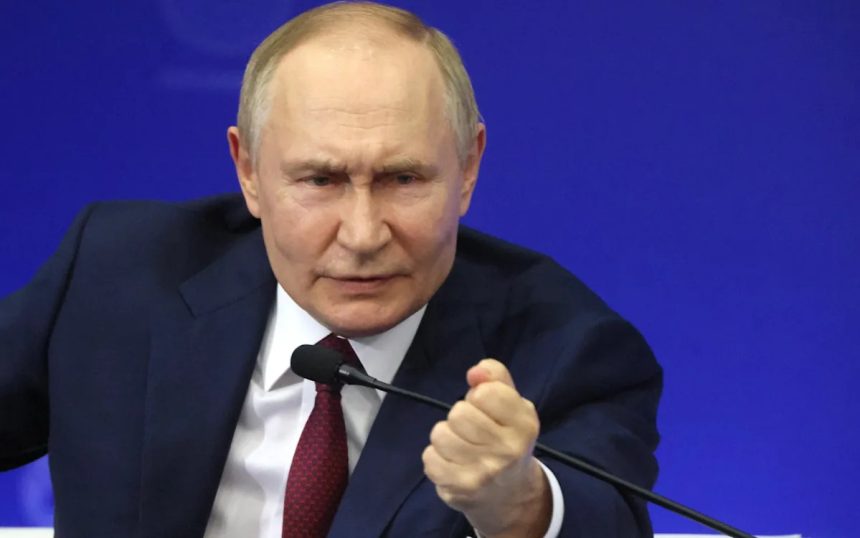Roman Alekhin ran a fervently pro-war Telegram channel, advised a Russian governor and received military honours for fighting in Ukraine.
He was a poster boy for so-called Z-bloggers, self-styled social media war correspondents unflinchingly loyal to the ideology behind Vladimir Putin’s invasion of Ukraine.
Then, the Russian state designated him a “foreign agent”.
The spectacle of Mr Alekhin’s dramatic rise and fall has spread fear among the online community that for nearly four years has apparently been allowed to critique and criticise the way the war is being fought.
Mr Alekhin’s fall from grace is a sign that not even pro-war critics are safe from the Russian regime – X
While anti-war activists were jailed in their thousands, a growing movement of ultranationalist military bloggers (or ‘milbloggers’) appeared to be rewarded with money, status and influence.
But Russia watchers have long warned that the Kremlin’s tolerance of them would run out – that time might be now.
Keir Giles, a senior Russia analyst at Chatham House, is surprised it had not happened sooner. “This is the kind of dissent that, if it was directed at the political system, would have earned reprisals long ago,” he said.
The Z-blogosphere “was seen by some as a safety valve, a means by which critics could vent without actually challenging the overall state policy,” Mr Giles told The Telegraph. “That avenue has now been closed off.”
Mr Alekhin, who was accused of misusing funds he raised for Russian troops after he flaunted a new sports car and an expensive watch on social media, isn’t the first of the milbloggers to fall foul of the state he so ardently championed, as the regime’s machinery of repression begins to eat it its own.
Sergey Markov, a prominent pro-Kremlin pundit, was listed as a “foreign agent” in August, a label with Stalin-era connotations once reserved for Russia’s enemies but increasingly employed at will by the state apparatus to silence any criticism.
Experts believe that Mr Markov was punished for his open support of Azerbaijan amid the collapse of Baku’s relations with Moscow. It marked a mighty fall from a once-trusted megaphone for Putin.

Sergei Markov, a once-trusted Putin propagandist, has been listed as a ‘foreign agent’ – Anadolu/Getty Images
Mr Markov, who insists he is loyal to the motherland, branded it a deliberate attack orchestrated by “corrupt officials” and “enemies of Russia”.
At the end of October, Tatyana Montyan, a former Ukrainian lawyer turned Russian pro-war propagandist, found herself added to Russia’s list of “terrorists and extremists” over claims related to the misappropriation of money raised for the front.
Last week, Oksana Kobeleva, the founder of a prominent pro-war Telegram channel, was detained by anti-extremism police, accused of discrediting the military after she criticised Chechen Akhmat special forces commander Apti Alaudinov.
All four deny wrongdoing. Although each case appears to have been triggered for different reasons, considered together, they signal a shift from purging dissenting voices to turning on traditional supporters who are sharing inconvenient truths.
“Once this machinery of repression starts, it cannot stop,” said Vladimir Kara-Murza, a British-Russian opposition activist sentenced to 25 years in a gulag for his criticism of the war. He was released in a prisoner swap in 2024.
Stalinist history repeating itself
He told The Telegraph: “Look back at the Soviet Union under Stalin, first they went after their political enemies and then the system began to devour its own people itself.”
The Z-bloggers, who often have close ties to the military, are both intrinsically useful and dangerous to the Russian state.
They lobby support for the war and mobilise public donations for the front, bringing in a vital cash flow. But they also hold a significant sway on public opinion and offer an alternative source of information on the war to the Kremlin’s official channels.
Take Operation Spiderweb, one of Ukraine’s most audacious missions of the war using drones smuggled on trucks to strike air bases deep inside Russia. According to the Kremlin-controlled media sphere, the attack in June was mostly repelled, the damage minimal.
Meanwhile, across social media, Russian milbloggers fumed over the incursion, posting footage of destroyed jets and blaming the Russian leadership for failing to protect some of its most prized assets.
Internecine rivalry in online community
According to Dr Martin Laryš, a senior researcher of the Institute of International Relations in Prague, the online community can be split into two distinct factions: the loyalist veteran propagandists and the growing grassroots movement of the Z-bloggers
Increasingly, he said, the two rival camps are turning on each other, attempting to discredit one another and compete over business interests.
The de-facto leader of the loyalists, who don’t stray from the Kremlin narrative, is Vladimir Solovyov, the powerful host on Russian state TV, who has in the past referred to the critical faction as “enemies” of the state who should be jailed for their critiques of the war effort.
The loyalists, Dr Laryš said, protect the commanders and the generals, while the more critical flank protects the soldiers fighting at the front, often railing against inadequate training and wasteful “meat-wave” assaults.
The increasing intolerance from both the Kremlin and the loyalists “signals the red lines are changing and the manoeuvring space for the critical community is narrowing”, he said. “It is a reflection of the worsening situation on the front line, including the increasing rate of desertions”.

Putin is showing increasing intolerance towards loyalists who dare question high command – Contributor/Getty Images
The scope of the foreign agents law continues to be widened. Originally intended to be used against organisations acting against state interests, “now nothing can stop it being applied against anyone”, said Tatiana Stanovaya, senior fellow at the Carnegie Russia Eurasia Centre.
It brings swift repercussions and social stigmatisation, including being forbidden from public sector work, banned from organising events or fundraising and all the person’s publications, including online content, must be labelled as “foreign agent” material.
Another indication of the regime’s increasing repression, she argued, is its increasing control of social media networks.
Having already blocked Facebook, Instagram and X, Russian authorities have increasingly clamped down on WhatsApp and Telegram, narrowing access to online content, while propping up state-controlled platforms.
The internet space is now heavily censored, monitored and weaponised for state control – and ordinary Russians are the victims.
“This is the logic of a new repressive, totalitarian system,” Mr Kara-Murza said, arguing it should send a message to all of Putin’s supporters.
“Once they finish with all of us [the political opposition], they’re going to start going after you, because once this machinery of repression starts, it cannot stop until the dictatorship crumbles and falls.”









